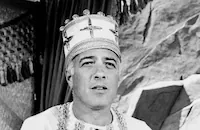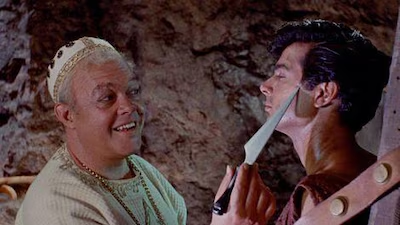Atlantis, the Lost Continent

Brief Synopsis
Cast & Crew
George Pal
Anthony Hall
Joyce Taylor
John Dall
Bill Smith
Frank De Kova
Film Details
Technical Specs

Synopsis
Demetrios, a young sailor in ancient Greece, finds an unconscious girl adrift in the Mediterranean. Upon awakening, she informs him that she is the Princess Antillia of Atlantis, and he agrees to take her home. When they arrive in Atlantis, Antillia learns that her father's power has been usurped by Zaren, the minister of war, who plans to conquer the world with a deadly crystal that lies embedded in an extinct volcano. To dislodge the crystal, Zaren has recruited hundreds of slaves, some of whom have been turned into animals by his surgeon. Though Demetrios is also forced into slavery, he wins his freedom when he overpowers a 7-foot man in the Ordeal by Fire and Water. Eventually Zaren succeeds in removing the crystal, but on the day that the great war is to begin, the volcano suddenly erupts. As Demetrios, Antillia, and some of the slaves escape in boats, Zaren turns the deadly rays of the crystal on them. Before he can kill them, however, he is destroyed by his own diabolical weapon. Waves of molten lava pour over Atlantis, and a mammoth tidal wave sweeps over the continent, causing it to sink into the sea. Demetrios, Antillia, and the other survivors sail away in search of a new continent.

Director

George Pal
Cast
Anthony Hall
Joyce Taylor

John Dall
Bill Smith

Frank De Kova
Edgar Stehli

Edward Platt

Berry Kroeger
Wolfe Barzell
Jay Novello
Buck Maffie
Paul Frees
Crew
Ridgeway Callow
George W. Davis
William Ferrari
Russ Garcia
A. Arnold Gillespie
Henry Grace
Charles K. Hagedon
Robert R. Hoag
Mary Keats
Lee Leblanc
Ben Lewis
Daniel Mainwaring
Franklin Milton
George Pal
George Pal
Dick Pefferle
Project Unlimited
William Tuttle
Harold E. Wellman

Photo Collections
Videos
Movie Clip



Trailer
Film Details
Technical Specs

Articles
Atlantis, the Lost Continent
As escapist entertainment for juvenile audiences, Atlantis, the Lost Continent delivers the goods and thrilled the kiddie matinee crowds of its era but Pal faced numerous challenges while making the film. Initially, he had cast Italian actor Fabrizio Mioni in the role of Demetrios the fisherman but when the actor's work visa expired, he was forced to return to Italy. Pal then turned to his leading lady, Joyce Taylor (it was her first starring role under her recent MGM contract), for assistance in casting the male lead. "Bill Shatner I did a test with," Taylor revealed in an interview with Tom Weaver (in his book, Monsters, Mutants and Heavenly Creatures), "we kind of laughed through it, because Bill thought it was like a joke. He said, 'You can't be serious. I'm just not the Greek god type!' I did a bunch of tests with different actors and Mr. Pal said to me, 'Why don't you pick your own leading man? Who do you want?' I really wanted Dick [Richard] Chamberlain." But Taylor's agents at MCA pressured her to choose Anthony Hall instead. Another disappointment for Taylor, who began her entertainment career as a singer, was seeing her musical number dropped from the film -- she was slated to perform the title song.
Most of the exteriors for Atlantis, the Lost Continent were shot in and around Catalina Island, off the coast of Los Angeles. The interiors were filmed at MGM soundstages and for one scene in a boat Taylor recalled (in Tom Weaver's book), "...there were wind machines, and we were up very high. As a matter of fact, I nearly fell off the boat...it was on some sort of 'legs' that made it rock. They were tilting it from one side to the other and the wind machine was going, and at one point I lost my balance. I came so close to falling off that the whole crew gasped -- in particular, Mr. Pal!" Despite her earlier reservations about her co-star, Taylor enjoyed working with Hall but he had his limitations, "poor Anthony did not know how to swim. He was from, what? Philadelphia or something, and he had never been in the water, so that was a problem! If you'll notice, he only did the breast stroke, and even that was in shallow water. Another thing I remember is that he had a vaccination mark on his shoulder, and it shows in one of the scenes. At one of the first premieres, people broke up laughing when that showed."
Unlike several of George Pal's other fantasy films such as Destination Moon (1950), The Time Machine (1960) and Tom Thumb (1958), Atlantis, the Lost Continent didn't win an Oscar for its special effects. Yet, for its time, the scenes of the death-ray crystals zapping buildings and humans and the final destruction of Atlantis were quite impressive and most critical notices were positive. Particularly memorable was this review of the film by Bosley Crowther in the New York Times: "...an adult may find some wry amusement in spotting a couple of noticeable little things such as the fact that Greeks and Atlantans all speak English and use underarm deodorants. For our taste, the most rewarding moment comes when Berry Kroeger in the role of the hypnotizing wizard who turns slaves into pigs, fixes the eye of one of his victims and says, 'Repeat after me: every day in every way I'm getting to be a boar.' "
Producer/Director: George Pal
Screenplay: Gerald Hargreaves (play), Daniel Mainwaring
Cinematography: Harold E. Wellman
Film Editing: Ben Lewis
Art Direction: George W. Davis, William Ferrari
Music: Russell Garcia
Principal Cast: Anthony Hall (Demetrios), Joyce Taylor (Princess Antillia), John Dall (Zaren), William Smith (Captain of the Guard), Edward Platt (Azor), Frank DeKova (Sonoy).
C-91m.
by Jeff Stafford

Atlantis, the Lost Continent
Quotes
Trivia
The budget for this film was stretched by using footage from Quo Vadis? (1951).
Several shots from MGM's _Quo Vadis (1951)_ , Paramount's Naked Jungle, The (1954) and other films are used in this film.
When a preview of this film was shown, a questionnaire was distributed among the viewers asking what scene they liked. One person answered, "The scene where Robert Taylor saved Deborah Kerr from the fire." This was in reference to the fact that much of the stock footage used in the film came from Quo Vadis? (1951).
The special effects model of the Atlantean submarine has been part of the collection owned by Forrest J. Ackerman for many years.
In addition to his credited narration, Paul Frees, without additional credit, dubbed the voices of three actors: An unknown appearing briefly as a messenger, and both Wolfe Barzell and Edgar Stehli, who played the fathers of the hero and heroine respectively.
Miscellaneous Notes
Released in United States May 3, 1961
Released in United States Winter December 31, 1960
Released in United States May 3, 1961
Released in United States Winter December 31, 1960














